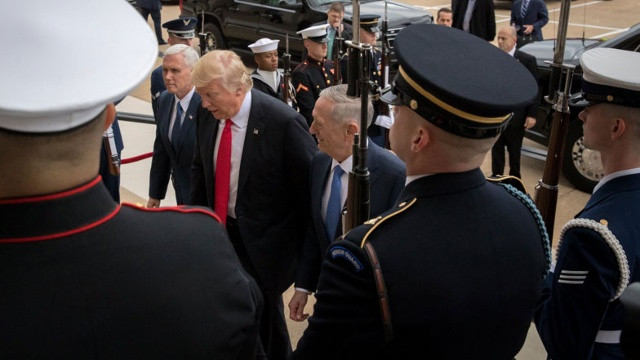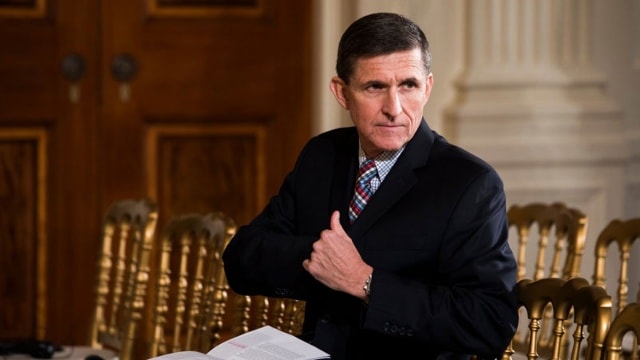US National Security Council 'in chaos' with Trump
The US National Security Council, the body that has long helped the President deal with an uncertain world, is in turmoil and anxiety.
Three weeks into the Trump administration, council members wake up every morning to read President Trump’s tweets and scramble to adjust policy to match them. Much of what Trump says on the phone with foreign leaders remains private.
 |
| President Trump and other administration leaders. Photo: New York Times. |
Many turned to coded communications with colleagues after hearing senior advisers to Mr Trump consider an “insider threat” programme that could involve monitoring mobile phones and emails to prevent leaks.
The New York Times reported that national security adviser Michael T. Flynn is under investigation for allegedly talking to the Russian ambassador to the United States about lifting sanctions in the final days of the Obama administration, and whether Flynn lied to Vice President Mike Pence about these conversations.
His political life is in the balance. There is now a transcript of at least one of Mr Flynn’s phone conversations, intercepted by US intelligence agencies – which could determine his future.
White House senior policy adviser Stephen Miller has been cautious about Flynn's future, saying the possibility that Flynn lied to the vice president about his Russian conversations was a 'sensitive matter'. Asked by NBC if Trump still trusted Flynn, Miller said: 'That's a question for the president.'
The US National Security Council (NSC) is made up of hundreds of civil servants whose job is to advise the president on counterterrorism, foreign policy, missile defense, and other issues of war and peace.
“The National Security Council is operating in a very unusual way right now,” said Representative Adam B. Schiff of California, the top Democrat on the House Intelligence Committee.
Deputy National Security Adviser KTMcFarland said the initial meetings were more exciting, tense and assertive than in the past, but she understood that staffers' careers were on the line.
“Not only is it a new administration, but it's a different party, and Donald Trump was elected by people who want to change the status quo,” McFarland said, adding that she felt “terrified by the changes,” because “most of the cabinet had never served in government.”
 |
| US National Security Advisor Michael Flynn. Photo: AP |
Every new NSC has an experimental phase, as personnel are brought in from the State Department, the Pentagon, and other agencies. President Barack Obama replaced his first senior national security adviser, General James Jones, after deciding he was not a good fit for his administration.
The early years of President George W. Bush's term were marked by clashes between veteran officials such as Dick Cheney, Donald Rumsfeld and Colin Powell, and decisions were often made outside official channels.
But what happened under President Trump was different, and not just because of his Twitter-style foreign policy.
Most of the staff who did not want to work for Mr. Trump returned to their regular agencies, leaving a huge hole in the current system. Those who remained were annoyed by the open partisanship.
Many people met at a bar near the White House and talked about 'cleansing' their social media accounts, to avoid being suspected of having 'anti-Trump' ideology.
The council’s staffers, many of whom have military backgrounds and who often have prior ties to Mr. Flynn, tend to present ideas that are more related to military initiatives than diplomatic ones.
Last week, Defense Secretary Jim Mattis explored whether the US Navy should intercept and search Iranian ships for weapons that could be going to Houthi rebels in Yemen.
The intervention was also consistent with recent directives from Mr. Trump, and was reinforced in meetings with Mr. Mattis and Secretary of State Rex W. Tillerson.
But the ship was in international waters in the Arabian Sea, and Mr. Mattis was forced to put the operation aside.
White House officials say the reason is because of information leaks about the operation, but others are concerned about the legal basis under international law, and whether if the operation goes ahead, the new administration's clumsy military action in Yemen could lead to a clash with the Iranian Navy.
On paper, Obama used to like his policy options to be presented in three to six pages. Now, council staffers are told they should be presented on one page, with lots of graphics and maps, because 'the president likes maps.'
The writing process has also been hit and miss. A senior Pentagon official saw a draft of the executive order on prisoner treatment through unofficial rumors and media leaks.
The lack of order in the council documents was ultimately Mr. Flynn’s responsibility, officials said, explaining why Mr. Mattis and Mike Pompeo, the CIA director, never read some of Mr. Trump’s executive orders before they were released.
One order was even amended after its release to ensure Mr Pompeo had a permanent seat on the council. The White House said this was absurd, and that the review process for executive orders was handled by White House Chief of Staff Reince Priebus himself.
But Mr. Flynn has created more problems. Aides say he is uneasy about losing the unfettered access he had during the campaign and that the council is being overshadowed by chief strategist Stephen K. Bannon.
For his part, Mr. Bannon believes that the US's clash with two rivals - China and Iran - is inevitable.
Mr. Flynn was surprised to learn that the State Department and Congress play a key role in foreign arms sales and technology transfers, so Mr. Trump cannot simply ask the Pentagon to send more weapons to Saudi Arabia, or transfer larger arms packages to the United Arab Emirates.
Until now, Mr. Flynn had not been accustomed to calling up the National Guard in an emergency situation, such as a natural disaster or a dirty bomb exploding in an American city.
According to Vietnamnet
| RELATED NEWS |
|---|
